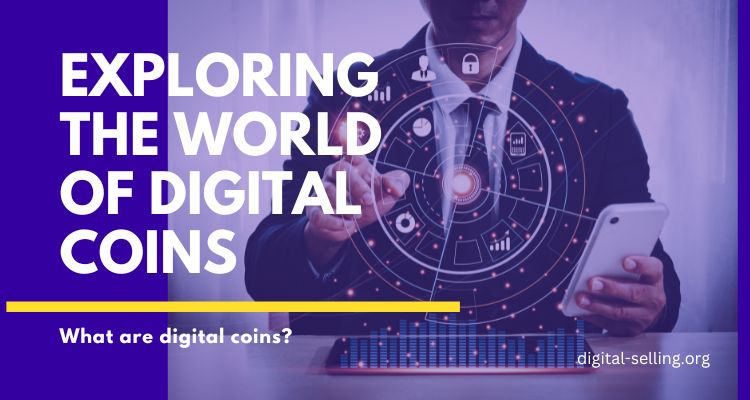From my conversations with family and friends there is a lot of confusion about, what are digital coins? This article will try to resolve it.
In the rapidly evolving landscape of finance and technology, digital currencies have emerged as a revolutionary force, reshaping the way we perceive and conduct transactions. As the world transitions towards a more digitised economy, understanding the fundamentals of these digital assets becomes crucial. In this article, we will delve into the question that echoes in the minds of many: What are digital coins?
Defining Digital Coins
Digital coins, also known as cryptocurrencies, are a form of digital or virtual currency that leverage cryptographic techniques for secure financial transactions. Unlike traditional currencies issued and regulated by governments, digital coins operate on decentralised networks based on blockchain technology. Blockchain, the underlying technology of most digital currencies, is a distributed ledger that records and verifies transactions across a network of computers.
The Birth of Digital Coins
The concept of digital coins traces back to the introduction of Bitcoin in 2009 by an anonymous entity known as Satoshi Nakamoto. Bitcoin, often referred to as the pioneer of cryptocurrencies, laid the foundation for a new era in finance. It introduced the idea of a decentralised, peer-to-peer electronic cash system, eliminating the need for intermediaries like banks.
Key Characteristics of Digital Currencies
- Decentralisation: One of the defining features of digital currencies is decentralisation. Traditional currencies are controlled by central authorities like governments and central banks. In contrast, digital currencies operate on decentralised networks, making them resistant to manipulation and censorship.
- Blockchain Technology: Digital currencies rely on blockchain technology to secure and verify transactions. Blockchain is a tamper-resistant, transparent, and decentralised ledger that records all transactions across a network. This ensures the integrity of the digital coin system.
- Limited Supply: Many digital currencies, like Bitcoin, have a predetermined supply limit, creating scarcity similar to precious metals. This feature is designed to prevent inflation and maintain the value of the digital coin over time.
- Anonymity and Privacy: Digital currencies offer a degree of anonymity and privacy in transactions. While the level of privacy varies among different cryptocurrencies, the underlying technology allows users to transact without revealing personal information.
- Global Accessibility: Digital currencies transcend geographical boundaries, providing a global and inclusive financial system. Users can send and receive digital currencies anywhere in the world without the need for traditional banking infrastructure.
- Volatility: The value of digital currencies is known for its volatility. Prices can experience significant fluctuations within short periods, presenting both opportunities and risks for investors. Factors such as market demand, regulatory developments, and technological advancements contribute to this volatility.
- Smart Contracts: Some digital currencies, like Ethereum, enable the creation and execution of smart contracts. Smart contracts are self-executing contracts with the terms of the agreement directly written into code. In addition, they automate and enforce the execution of contractual agreements without the need for intermediaries.
The Growing Ecosystem of Digital Coins
Since the inception of Bitcoin, the digital coin ecosystem has expanded exponentially. Thousands of different digital coins, also known as altcoins, now exist, each with its unique features and use cases. Ethereum, Ripple, Litecoin, and Cardano are just a few examples of digital currencies that have gained prominence in this diverse landscape.
Use Cases of Digital Coins
- Medium of Exchange: Digital coins serve as a medium of exchange for goods and services in the digital realm. Some merchants and businesses now accept digital coins as a legitimate form of payment.
- Store of Value: Digital coins, particularly those with limited supply like Bitcoin, are often viewed as a store of value similar to precious metals. Investors use digital coins as a hedge against inflation and economic uncertainties.
- Remittances: Digital coins provide a faster and more cost-effective alternative for cross-border transactions and remittances compared to traditional banking systems.
- Decentralised Finance (DeFi): Digital currencies play a crucial role in the rise of decentralised finance. DeFi platforms leverage blockchain and smart contracts to offer financial services such as lending, borrowing, and trading without traditional intermediaries.
- Tokenisation of Assets: Digital coins enable the tokenisation of real-world assets, such as real estate or art. This process involves representing ownership of physical assets as digital tokens on a blockchain, facilitating fractional ownership as well as increased liquidity.
Challenges and Concerns
While digital currencies offer numerous advantages, they also face challenges and concerns that warrant careful consideration. Regulatory uncertainties, security risks, and environmental concerns related to energy consumption in certain blockchain networks are among the issues that the digital coin ecosystem must address.
Conclusion
In conclusion, the world of digital coins represents a paradigm shift in the way we perceive and engage with finance. With their decentralised nature, blockchain technology, and diverse use cases, digital currencies have the potential to redefine the global financial landscape. As the digital coin ecosystem continues to evolve, understanding the fundamental question, “What are digital coins?” becomes not only a matter of curiosity but a necessity for anyone navigating the future of finance.





One thought on “Exploring the world of digital coins: What are digital coins?”